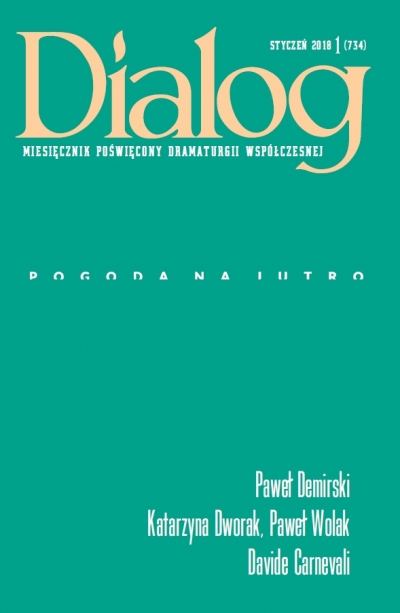Contents:
Plays
Paweł Demirski
K.
A political play, set in the near future. It is autumn 2019, the election evening. Jarosław Kaczynski ( K.) and his antagonist Donald Tusk follow the results of the polls, as it is about to turn out which of them will take over. Supporting them are figures of different status: election team members, ordinary people and ghosts. Unexpectedly, a coup is coming, but the last word will belong to someone else. This Shakespearian play depicts a drama of power, penetrating the genesis and current dynamics of the ideological conflict in Poland.
Katarzyna Dworak, Paweł Wolak
Faithful Pack
A dark tale set in a small town. In two competing families, only daughters come into the world, although everyone is waiting for the birth of a future priest. Finally, the youngest daughter is assigned to the monastery as a sacrifice. Brought up for a holy girl, she begins to rebel, and so does her father. Meanwhile the mother turns into a she-wolf in defense of the community. The community demands a bloody ritual. The play is written in a poetic language, stylized as a folk tale, but it presents universal mechanisms of exclusion.
Davide Carnevali
Variations of the Kraepelin model (or a semantic field of stewed rabbits) ( Variazioni sul modello di Kraepelin (o il campo semantico dei conigli in umido))
A father suffering from dementia is subjected to his son's cure - the use of treatment developed by psychologist Emil Kraepelin, based on constant return to events from the past, setting their detailed course and analyzing options and gaps in memories, becomes a pretext for reflection on European society of our times.
Essays, Studies
Weather forecast
We start a series of conversations with theatre people, artists, curators, theatre and cultural institutions managers about their situation, possibilities of action and plans for the future in the context of the state's cultural policy. In this issue we present:
To win people’s support.
Conversation with Paweł Łysak
The Political
Conversation with Marta Keil and Grzegorz Reske
A national body?
Conversation with Joanna Szymajda
Jolanta Kowalska
People and wolves
At the Modrzejewska Theatre in Legnica astonishingly many team members entered the path of creative emancipation. Katarzyna Dworak and Paweł Wolak, among others, received a chance for the authorial spectacle. Their directing and dramaturgical debut in the Sami [The Alone], accepted warmly, and boding well for the future, resulted in the creation of one of the most interesting creative duets in Polish theatre.
Zuzanna Grębecka
A pack of wolves and structure
On the two ends of the small town, two families with the same name, though unrelated. For years, each of them alternately - every second generation - sends one of the sons to the monastery. A proper opening of the play by the duo of Katarzyna Dworak and Paweł Wolak is a moment that could be called a structural crisis. The order of things arranged for years, awaited by both families, the remaining inhabitants of the town and - perhaps above all - the clergy, ceases to work: here is the lack of a male descendant who could join the seminary. Claude Levi-Strauss, analyzing the structure of the village and social life of the South American Bororo people, indicated that changes within this structure could lead to a breakup in the community. Such subcutaneous anxiety can also be felt by the characters of the Faithful Pack
Ewa Bal
Sclerosis of Europe
Published in this issue Carnevali’s Variations of the Kraepelin model (or a semantic field of stewed rabbits) refers to the figure of Emil Kraeplin, a German psychiatrist, director of a psychiatric clinic in Heidelberg of the late nineteenth century, where Albert Alzhaimer also worked for some time. It was Emil Kraepelin who used the term "Alzheimer's disease" for the first time in his posthumously published Psychiatry Manual of 1910. Carnevali, in turn, in his play referred to the mechanisms of forgetting as a dramaturgical model, mainly to help him build a non-linear dramatic action of the play, close to the concept of post-dramatic theatre by Hans Thies Lehmann.
Columns
Marek Beylin, Tadeusz Nyczek, Pedro Pereira



